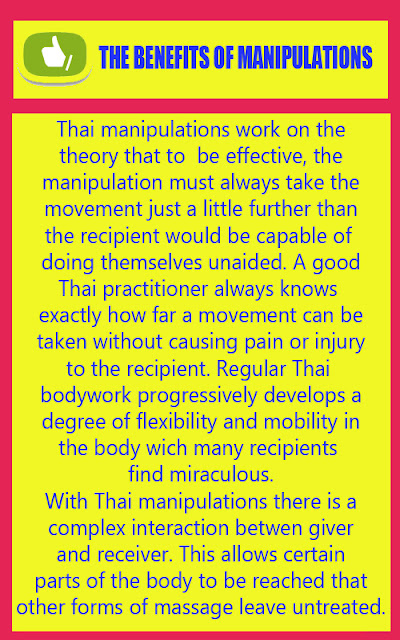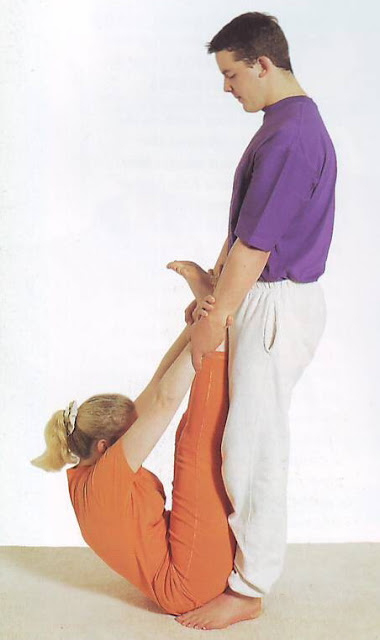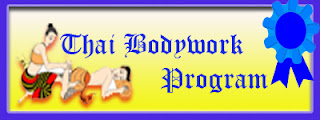Manipulation
Techniques
Manipulation
is the controlled movement of one or more parts of the body relative to others
to achieve specific effects such as stretching and twisting.
It
always involves leverage. The masseur must have a high sensitivity to its
effectiveness which can result in very powerful stretches and twists with
relatively little effort. A lack of this sensitivity could result in injury. In
order to avoid serious back strain caused by lifting and moving in the wrong
way, the giver should also be constantly aware of his/her own posture and
position relative to the receiver.

The Vertical Leg Stretch is
a manipulation which involves powerful leverage. A careless or insensitive masseur
could easily overstretch the hamstring, gluteal and even the lower back muscles
of the receiver. Always watch your partner’s expression, which will quickly
react to even a hint of overstretching.

Preparation for Manipulation
All the different parts of the body are manipulated
during Thai bodywork and manipulation is achieved through pulling, pushing,
lifting, shaking and rotating. The end result of these manipulations is
stretching and twisting.
So very impressive are the Thai manipulations that the therapist can be tempted to emphasize them at the expense of pressing techniques. This is a serious mistake. Pressure on the soft tissues prepares the receiver physiologically so that the greatest benefit can be derived from the manipulations that follow them. It is the pressure techniques that are most effective in the treatment of pain and in stimulating the flow of energy in the Sen channels.

Most manipulations involve
some lifting which means pulling against the receiver’s weight. A lift is a
simple manipulation where the body part is raised against the force of gravity.
No pushing is used.
This technique is carried
out on the limbs and it always involves an up and down movement. A slight pull
creates a degree of traction which makes the shaking even more effective.
This is a 360˚ movement
about joints such as the wrists, ankles, shoulders, hips and neck. It is the
result of alternate pushing and pulling techniques. Even joints affected by
osteoarthritis can have normal mobility restored through regular rotation.
Whenever a body part is
pulled, it must be anchored at its other end. Sometimes the subject’s body
weight achieves this. However, the strongest pulling often requires an opposing
push. Thai therapists frequently use their feet for this. The most powerful
sustained pulls are achieved when the practitioner’s body weight is used to
generate the effort. Leaning away from the subject creates this effect.

The sequence shown presents
a unique, whole body program devised by Maria Mercati and based on a synthesis
of techniques from northern and southern Thailand. In Thailand there are many
subtle variations in both the techniques and the massage sequence. Each step is demonstrated by a photograph; some photos have arrows superimposed to show you exactly where to apply pressure, and the healing benefits and key muscles used in each massage are listed alongside. Caution boxes indicate where you should take care with a particular technique, but it should be emphasized here again that Thai massage is not recommended during pregnancy.







